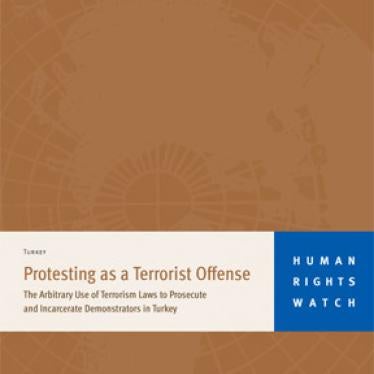(Istanbul) - Turkey restricted free speech and failed to advance minority rights during 2010, Human Rights Watch said today in its World Report 2011.
The 648-page report, the organization's 21st annual review of human rights practices around the globe, summarizes major human rights issues in more than 90 countries worldwide. In Turkey, the government places a growing emphasis on foreign policy and champions a "zero problems with neighbors" approach in the region, but failed throughout 2010 to address ongoing human rights problems at home, Human Rights Watch said in the report's chapter on Turkey.
"Turkey's foreign policy ambitions would be greatly reinforced by bold domestic reform on rights," said Benjamin Ward, deputy Europe and Central Asia director at Human Rights Watch. "Showing that it is serious about human rights would bolster Turkey's credibility on the international stage, and deliver the change that people in Turkey deserve."
The Justice and Development Party (AKP) government's constitutional amendments open the way for further reforms to strengthen human rights, Human Rights Watch said. But the government has failed to address serious ongoing concerns. These include unjustified prosecutions for alleged speech crimes, the arbitrary use of terrorism laws, unnecessarily prolonged pretrial detention, a clampdown on the legal pro-Kurdish Peace and Democracy Party (BDP), and police violence against demonstrators.
The government's partial revision of the constitution, approved by national referendum in September 2010, paves the way for creating an ombudsperson, limits the role of military courts, and gives individuals the right to petition the constitutional court to challenge the constitutionality of laws. It also ends immunity from prosecution for the leaders of the September 12, 1980 military coup and public officials who committed human rights abuses in its wake, among other reforms.
Despite a climate of increasingly open debate, the government prosecuted and convicted people during 2010 for nonviolent speeches, writings, and participating in demonstrations, Human Rights Watch said. Journalists and editors are frequent targets for prosecution, with some facing scores of ongoing legal proceedings in 2010.
"The authorities in Turkey see some speech as a threat to be countered rather than a right to be upheld," Ward said. "A confident Turkey has nothing to fear from free expression."
Another problem during 2010 was ill-treatment by the police, particularly during street stops, demonstrations, and arrests. The use of firearms by the police and the gendarmerie, particularly against unarmed suspects, was also a matter of concern, Human Rights Watch said. There was no progress on tightening rules governing use of force.
The government had announced a "democratic opening" in the summer of 2009 to uphold the human rights of all groups in Turkey, notably the Kurds but also other minority groups. But the government made little concrete progress toward these goals in 2010, Human Rights Watch said.
Hundreds of officials and activist members of the pro-Kurdish party DTP and its successor BDP, which has 20 members in parliament, were prosecuted during the year, for alleged links to the Union of Kurdistan Communities (KCK/TM), a body associated with the leadership of the outlawed Kurdistan Workers Party, or PKK.
The government put 152 BDP officials and activists on trial in October in Diyarbakir for alleged separatism and membership in the KCK. The defendants included seven mayors, several lawyers, and a human rights defender.
The courts used terrorism laws to prosecute hundreds of demonstrators deemed to be PKK supporters as if they were the group's armed militants, Human Rights Watch said. Most spent prolonged periods in pre-trial detention, and those convicted were sentenced to long prison terms. An amendment approved by parliament in July will mean that convictions of children as part of these prosecutions will be quashed. But the laws remain otherwise unchanged.
Impunity was a serious problem in 2010. In general, prosecutors failed to conduct effective, timely, and independent investigations of allegations against the police and gendarmerie, and there was little progress in prosecutions of state officials for human rights abuses.
A positive exception was a landmark ruling in June, when 19 prison guards, gendarmes, police officers, and a doctor were convicted in connection with the October 2008 beating to death of Engin Çeber, and the torture of three other political activists arrested with him in Istanbul.
Despite international media speculation on whether Turkey had "turned East" in its foreign policy focus, Turkey continued to emphasize its US and EU ties during 2010, Human Rights Watch said. But the US failed to capitalize on President Obama's 2009 visit to press for domestic human rights reform, and the several leading EU member states continued openly to oppose Turkey's membership.







